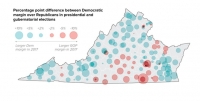What they don’t say is that the overall balance of U.S. security spending should be adjusted to fit that assessment. And we know less about how much we are spending on this urgent threat than we used to, since the federal government hasn’t produced a climate security budget since 2013.
In this new report, Combat vs. Climate, the Institute for Policy Studies steps in to provide the most accurate climate change security budget currently available, drawing data from multiple agencies. And it looks at how these expenditures stack up within our overall security budget.
Then, the report ties the military’s own assessment of its urgent threats to a budget that outlines a “whole of government” reapportionment that will put us on a path to averting climate catastrophe.
This is our status quo: As global temperatures hit one record after another, the stalemate in Congress over funding to respond continues. Climate scientists warn that, as in Syria, unless the global greenhouse gas buildup is reversed, the U.S. could be at risk for conflicts over basic resources like food and water. Meanwhile, plans to spend $1 trillion to modernize our entire nuclear arsenal remain in place, and projected costs of the ineffective F-35 fighter jet program continue to climb past $1.4 trillion. Unless we get serious about moving the money, alarms from all over about the national security dangers of climate change will ring hollow.
Key Findings:
- The U.S spends 28 times as much on traditional military security as on climate security. This is hardly commensurate with the magnitude of this “urgent and growing threat to national security.” The pound of military cure still vastly outweighs the ounce of climate catastrophe prevention. Indeed, applying the proportions of pound-to-ounce, that is, 16:1, would be a huge improvement.
- Though China has now pulled ahead of the U.S. as the world “leader” in total current emissions, China’s overall security budget currently reflects a better balance between expenditures on military and climate than the U.S. The U.S. spends more than two and a half times what China spends on its military forces. And China spends about one and a half times what the U.S. spends on climate change.
- If we canceled the F-35, the most expensive weapon system ever envisioned, which cannot perform as well as the systems it is designed to replace, we could build 15 more offshore wind projects like Block Island, RI, generating enough capacity to power 320,000 U.S. homes.
- If we shift the money currently being spent on the Air Launched Cruise Missile Follow-On (LRSO), we could install 11.5 million square feet of solar panels on buildings, keeping 210,000 tons of CO2 out of the air annually.


 Imagine going to the polls on Election Day and discovering that your ballot could be collected and reviewed by the
Imagine going to the polls on Election Day and discovering that your ballot could be collected and reviewed by the ACLU Blueprints Offer Vision to Cut US Incarceration Rate in Half by Prioritizing 'People Over Prisons'
ACLU Blueprints Offer Vision to Cut US Incarceration Rate in Half by Prioritizing 'People Over Prisons'  "These disasters drag into the light exactly who is already being thrown away," notes Naomi Klein
"These disasters drag into the light exactly who is already being thrown away," notes Naomi Klein  How about some good news? Kansas Democratic Representative advances bill for Native Peoples.
How about some good news? Kansas Democratic Representative advances bill for Native Peoples.  What mattered was that he showed up — that he put himself in front of the people whose opinions on
What mattered was that he showed up — that he put himself in front of the people whose opinions on On a night of Democratic victories, one of the most significant wins came in Virginia, where the party held onto
On a night of Democratic victories, one of the most significant wins came in Virginia, where the party held onto A seismic political battle that could send shockwaves all the way to the White House was launched last week in
A seismic political battle that could send shockwaves all the way to the White House was launched last week in In an interview with Reuters conducted a month after he took office, Donald Trump asserted that the U.S. had “fallen
In an interview with Reuters conducted a month after he took office, Donald Trump asserted that the U.S. had “fallen Attorney General Jeff Sessions overturned the sweeping criminal charging policy of former attorney general Eric H. Holder Jr. and directed
Attorney General Jeff Sessions overturned the sweeping criminal charging policy of former attorney general Eric H. Holder Jr. and directed